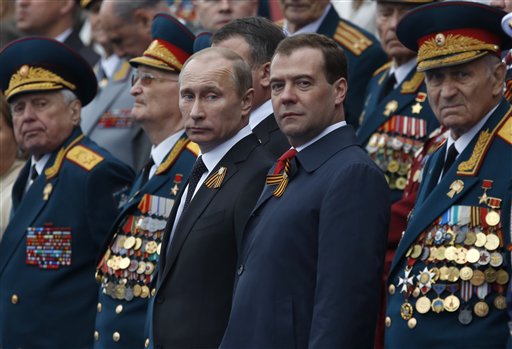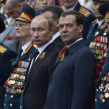
Police Brutality Reactivates the Anti-Putin Movement in Moscow
Publication: Eurasia Daily Monitor Volume: 9 Issue: 89
By:

President Vladimir Putin proceeded smoothly from inauguration on May 7 to overseeing a massive Soviet-style military parade on Red Square on May 9. Putin’s choice as Prime Minister, former president Dmitry Medvedev, was easily voted into office by the Duma. On Red Square, some 14,000 men in Soviet-style gold-glittering parade uniforms and most wearing peaked hats goose-stepped to the thrill of martial music produced by a 1,100-member joint military orchestra. Tanks, self-propelled guns, missiles and armored vehicles (over 100 pieces) rolled past Putin, flanked on the stand by Medvedev and Defense Minister Anatoly Serdyukov (RIA Novosti, May 9).
Putin’s speeches on May 7 in the Kremlin and on May 9 on Red Square were traditional, emphasizing Russia’s past glory, future greatness and the need for the people to unite under his leadership as during the Great Patriotic War with Nazi Germany: “We must remember why the [Second World] War began, analyze its lessons that are still essential – strictly keep international norms, respect state sovereignty and the independent choice of each nation. [Adhering to that] is one of the unequivocal guaranties that the tragedy of the past [Second World] War will not be ever repeated” (www.kremlin.ru, May 9). Putin was apparently referring to Western actions in facilitating the fall of Libyan dictator Muammar Gaddafi in 2011 and pressure on the present Syrian regime to stop mass oppression. Putin consistently has criticized NATO bombing in Libya, and Russia together with China has vetoed sanctions against Syria in the UN (EDM, April 19). Putin ended his Red Square speech by shouting “Glory to Russia!” – a trademark street slogan of Russian nationalist and pro-Nazi groups (often accompanied by a Nazi-style salute).
Putin’s advances to the nationalist constituency did not seem to work as nationalists continued to take part in anti-Putin protests together with liberal, prodemocracy, human rights, leftist, anarchist, antifascist, ecological, and gay and lesbian rights activists. This grand anti-Putin protest coalition formed last December and is still alive. A “march of millions” on May 6 to protest Putin’s inauguration, pre-sanctioned by the authorities, turned ugly after riot police (the OMON) prevented a column of tens of thousands of protesters and activists from entering a designated rally area in downtown Moscow under the pretext that the space was already full. The riot police senselessly squeezed the crowd, met resistance and soon began massive baton charges, indiscriminately beating and dragging away men, women and journalists. The protest rally was effectively disrupted, but part of the protesters formed a tight formation and continued to hold their ground for several hours before dispersing into the surrounding streets where the OMON continued to chase them late into the night. Up to 600 protesters were arrested, but most were soon released (Kommersant, May 10).
The OMON brutality on May 6 galvanized the shrinking protest movement. Activists dispersed through the maze of downtown Moscow streets and, though without slogans, continued to “promenade” with white opposition ribbons, or to “picnic” in parks and squares by self-organizing through Internet social networks. Police continued to arrest activists wearing white ribbons. Several Duma deputies from the Just Russia party that enjoy arrest immunity have been helping to fend off police attacks and negotiate prisoner releases. These “promenade protests” have continued from May 7 through May 10, frustrating the Russian authorities and police. The most prominent protest leaders – anticorruption activist Aleksei Navalny and leftist Sergei Udaltsov – were jailed on May 9 for 15 days “for resisting police,” but this did not stop the widespread protests. On May 9, hundreds of protesters joined a pre-approved Communist march and rally in central Moscow, forming a separate “white” column, carrying anti-Putin banners and shouting slogans. After the Communists dispersed, the prodemocracy protesters continued their campaign of promenades and sit-ins (Kommersant, May 10).
On May 10, Russians returned to work after a long holiday, but some young protesters continue to stay permanently in a boulevard close to the Novaya Gazeta headquarters in downtown Moscow. The authorities seem not sure what to do next. A group of prominent Russian writers, journalists, poets, pop musicians and TV personalities have announced that on May 13 they will gather at Pushkin Square in downtown Moscow and “promenade” down the boulevard ring. Bestselling author and prodemocracy activist Boris Akunin invited the public and city authorities to join the group of dignitaries “to test if Muscovites are free to promenade in their city squares and parks, or if some special pass is required” (RIA Novosti, May 10).
The authorities are showing signs of stress and disarray. On May 9, the police refrained from mass arrests, but, in the evening, Red Square was suddenly closed to the public by police cordons when thousands of innocent pedestrians came to see the traditional May 9 fireworks. The crowds of loyal holiday sightseers were confined to the nearby Manez Square, where the fireworks were out of sight, obscured by the massive facade of the Kremlin (Interfax, May 9). Putin, speaking by phone with President Obama, informed him he will not be attending the G8 summit on May 18-19 at Camp David in Maryland and will send Medvedev instead, because of the need to finalize cabinet appointments. Obama and Putin now plan to meet during the June 18-19, G20 summit in Los Cabos, Mexico (RIA Novosti, May 10).
The sudden change of heart seems strange, since by law Medvedev must present his entire cabinet by May 15. It also puts Obama in an awkward position. Initially, the G8 was planned for Chicago to precede the NATO 2012 summit. Since Putin decided not to attend Chicago because of ballistic missile defense (BMD) disagreements, the G8 venue was shifted to Camp David to allow Obama a first meeting with Putin as President (Kommersant, May 11).
The Russian police has demonstrated it is badly prepared to control a restive Moscow. The OMON is relatively small in size, capable of chasing a crowd, but not equipped to control a city of up to 20 million. The Internal Troops units used as backup in recent days are inept conscripts with less than a year of service. The Moscow precinct police are corrupt; their morale is low and riot training – zero. Arresting the protest leaders only mobilized the social-networked activists, who do not have a distinct chain of command. If Putin is out of touch, however – say while at Camp David – the regime may implode in hours since no one is ready to act decisively in an emergency without direct orders. It is possible that Putin does not dare leave Russia, afraid the Moscow protests may swell out of control.




